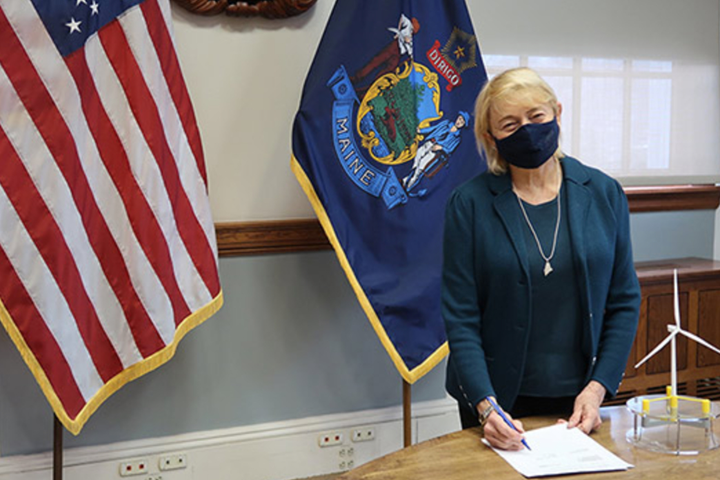Maine, U.K. sign agreement to advance offshore wind cooperation
The commitment outlines strengthening offshore wind and green hydrogen supply chains via clean, innovative technologies to meet ambitious carbon neutrality goals and promote and foster sustainable growth.

On Dec. 10, Governor Janet Mills of Maine and the U.K.’s Minister of State at the Department of Business, Energy and Industrial Strategy (BEIS), the RT Hon Kwasi Kwarteng MP, announced the signing a Memorandum of Understanding (MoU) to enhance cooperation between the state of Maine and the U.K. to pursue ambitious advancement in clean energy technologies and mutually achieve carbon neutrality by mid-century or sooner. MoU expectations also ensure the promotion and fostering of sustainable growth, supporting innovation and strengthening the global response to climate change.
Specifically, the MoU commits Maine and the U.K. to collaborate and share resources to reduce emissions from heating and transportation and advance innovative offshore wind and green hydrogen technology, sectors in which the use of composites has advanced, from new, longer wind blades in offshore wind turbines, to storage tanks for hydrogen.
For example, the Dominion Energy Coastal Virginia Offshore Wind project will use turbines with a 222-meter diameter rotor, equipped with new Siemens Gamesa B108 blades. Nearly 50 feet taller than the Statue of Liberty, each 108-meter long IntegralBlade is cast in one piece using patented Siemens Gamesa (SGRE, Zamudio, Spain) technology. Meanwhile, Dogger Bank Wind Farms is developing what will reportedly become the world’s largest offshore wind farm off the coast of the U.K., which will use GE Renewable Energy's (Paris, France) Haliade-X wind turbines equipped with 107-meter-long wind turbine blades built by LM Wind Power.
Additional cooperation also calls on on evaluating impacts of offshore wind on fisheries and the marine environment, workforce development and port infrastructure. The cooperation reflects the growing need for international collaboration on climate and energy.
“The U.K. has led the way globally in using offshore wind to reduce emissions and we are pleased to be working with Governor Mills and her team to share our experience,” says U.K. Energy Minister Kwasi Kwarteng. “This partnership with Maine will help both the United States and the U.K. take another step towards our critical climate change goals.”
The genesis for this agreement came in early 2020, following Governor Mills’ visit to Scotland as part of a U.S. delegation of state and federal officials invited by the U.K. government to learn more about offshore wind energy.
“With offshore wind investment expected to top $70 billion in the U.S. this decade, the relationship with the U.K. offers a tremendous scientific, technical and environmental expertise that will inform Maine’s future in this growing field, and help it co-exist with our important marine industries, especially fishing,” adds Dan Burgess, director of the Governor’s Energy Office in in Maine.
With what she says are some of the richest wind resources in the world in the Gulf of Maine, Governor Janet Mills has made developing offshore wind a leading part of her climate change and economic recovery policies. In November, she announced the state’s intention to seek the first floating offshore wind research lease in the U.S., which would deploy up to a dozen floating wind turbines in the Gulf of Maine.
The MoU took effect on Wednesday, Dec. 9, 2020, and will remain valid for a period of five years.
Related Content
-
JEC World 2023 highlights: Recyclable resins, renewable energy solutions, award-winning automotive
CW technical editor Hannah Mason recaps some of the technology on display at JEC World, including natural, bio-based or recyclable materials solutions, innovative automotive and renewable energy components and more.
-
Hexagon Purus opens new U.S. facility to manufacture composite hydrogen tanks
CW attends the opening of Westminster, Maryland, site and shares the company’s history, vision and leading role in H2 storage systems.
-
Recycling end-of-life composite parts: New methods, markets
From infrastructure solutions to consumer products, Polish recycler Anmet and Netherlands-based researchers are developing new methods for repurposing wind turbine blades and other composite parts.

















.jpg;maxWidth=300;quality=90)

